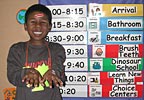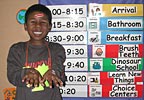Teacher Resources and Support Strategies for Overwhelmed Educators

Check out our blog for social-emotional learning articles, news, and more!

 Carolyn Webster-Stratton adores and understands kids who throw things, bite, kick, refuse to obey every request or command and who rarely get invited to birthday parties. Kids who are asked to leave preschools and, if they are invited to a play date, are never asked again.
Carolyn Webster-Stratton adores and understands kids who throw things, bite, kick, refuse to obey every request or command and who rarely get invited to birthday parties. Kids who are asked to leave preschools and, if they are invited to a play date, are never asked again.
And through every encounter Webster-Stratton appears as a woman wrapped in calm, a calm that puts visitors at ease the minute she enters a room.
Carolyn Webster-Stratton, whose work focuses on helping children ages 3 to 8, uses the puppets shown in her University District office to interact during therapy sessions. Her office is a dinosaur haven and her windowsills overflow with stuffed animals and a multiracial classroom of puppets, some of them in sizes and shapes similar to her clients. Children talk to the puppets, and this clinical psychologist listens.
Webster-Stratton is an ally of children who bring parents to their knees -- children with conduct problems, a generic term for children who are highly oppositional, defiant, aggressive. These disruptive disorders affect about 8 percent of the population.
"That's a lot of kids, and services for these children are few and far between," she said. "Aggressive behavior is an important risk factor related to later violence."
That's why she's focused on children ages 3 to 8, a key time to break the trajectory. Without early intervention, these children are at risk of getting kicked out of schools, living with anti-social behaviors, abusing drugs and alcohol and eventually facing criminal charges as they age.
She's shown that these children can be helped, and dreams of the day when parents and educators are as attuned to developing emotional skills as academic skills.
"All kids yell, hit, bite, scream," Webster-Stratton said of her subjects. "These kids do it at a greater frequency and intensity." Most children are aggressive at 2 and 3, but that aggression decelerates at 4 or 5.
"A typical 5-year-old will disobey about one-third of the time, but do what is asked two-thirds of the time," she said. "Children with defiance or conduct disorders refuse most of the time. Unless they obey, they can't be socialized or taught.
"Highly aggressive children tend to stay that way throughout life unless they are helped. Both parents and teachers need to be involved in promoting social skills and replacing aggressive behavior."
That means learning how to share, follow directions and use words to ask for what they want, for example.
Webster-Stratton said society, unfairly, tends to blame parents for kids with misbehavior issues: "The biology a child gets isn't something they can do anything about."
She cites three factors affecting a child with conduct problems: biology, family and school.
Biologically, a child's "wiring" could be off, making him difficult to deal with. He might have additional issues such as an attention deficit disorder.
Family factors include neglect, high stress, poverty, harsh punishments and abuse.
Schools can add a high student-to-teacher ratio, not enough help, a teacher who isn't tuned in to these disorders.
A combination of these risk factors can be overwhelming for an affected child.
Webster-Stratton has spent more than 30 years working to break that cycle. She's worked with children, their families and teachers. She's researched, developed and published curricula, books and videotapes -- programs that are now used in countries throughout the world.
And she's been at it long enough to track the results, which are impressive. On a three-year follow-up, more than two-thirds of the children were in the normal range on standardized measures completed by teachers and parents.
In the late 1970s this UW psychologist and professor began a parenting program with middle-class families, teaching them how to bring out the best in their kids and to deal with common behavior problems. But when she tried to publish it, editors said, "Who cares about the middle class?"
"It led me to take the program to lower-income families, often single-parent families with a child," Webster-Stratton said. "That's what hooked me on this population."
She taught classes at Children's Hospital and Regional Medical Center to highly motivated parents who made huge efforts (as in several bus transfers) to learn ways to deal with their children.
Those classes led to programs for children, parents and teachers -- prevention programs usually focused on schools with high rates of children in free-lunch programs. Teachers have been trained to deal with behavior and to offer a social and emotional curriculum. Parents are often offered classes in the schools their children attend, parenting classes open to all.
Webster-Stratton's years in the field and follow-up studies have proved that an increase in social competence decreases aggressive behavior.
John Bancroft, director of Head Start for Puget Sound, has known Webster-Stratton and her work for a long time. She worked with him in a Head Start program for three years in the early 1990s.
"I liked her involvement of parents," Bancroft said. "She was willing and eager to train parents to train other parents. There's no professional aloofness. I would say it was one of the most successful parent education programs we've done in Head Start."
Another mark of her success was having 70 percent to 80 percent of parents participate. "That was unheard of," Bancroft said.
It was information to help all parents, not just parents of challenging children.
Webster-Stratton's dream is for social and emotional curriculums to be regarded as being as important as reading or math. "You can't separate them," she said. "Better social/emotional skills (lead to) better academic outcomes."
She also noted that we can take courses in almost any subject, but courses in parenting are rare. "We should 'immunize' parents to be the best parents they can be," Webster-Stratton said.
She speaks from professional and personal experiences. A native of Canada, she has a nursing degree from University of Toronto, two master's degrees from Yale -- one in public health and another as pediatric nurse practitioner, and a doctorate in educational psychology from the UW.
After working with children for years, she had two sons, now 20 and 22. Did motherhood cause her to rethink any of her programs?
The question made her laugh. She said that's when she developed her Advanced Parenting Program focusing on anger and depression management, problem solving, communication skills and giving and getting support.
PARENTING TIPS
Social skills are as important as numbers and the alphabet for preschoolers.
If parents feel they've lost control with their child, they should seek help.
Teachers are good at spotting problems because they have more perspective.
Parents can get away with some "slop" in their parenting skills with typical kids, but not with those with conduct problems.
Children with conduct disorders can be so inattentive they miss both praise and commands.
Attention is a powerful reward. It works when teachers ignore kids who are out of their seats and praise those who stay seated, for example.
Don't reinforce misbehavior.
Develop a meaningful relationship with your child and partner with your child's teacher. -- Source: Carolyn Webster-Stratton
TO LEARN MORE
To learn more about Webster-Stratton, her programs and books, go to incredibleyears.com
Children's Hospital and Regional Medical Center in Seattle offers parenting classes and other programs. Call the hot line: 206-987-2500.





